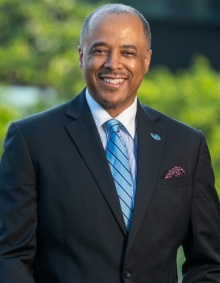Dean's Column
From Dean Keith A. Alford

Welcome to this issue of Mosaics. In these still-challenging times, I first hope that you are all being mindful of your own health and well-being. With the slate of societal and global challenges we face, it’s important to continue to acknowledge triumphs and grace.
This issue of Mosaics highlights some of the good work that our faculty and alumni are doing; we look at Asst. Prof. Noelle St. Vil’s work connecting with racially underrepresented students, helping to support and navigate their journeys with respect and dignity.
As long-time Prof. Deborah Waldrop prepares to retire, we bid her farewell. The story of how she came to social work education and research is an inspiring one. And her impressive, numerous contributions to the field of gerontological social work will continue to have an impact in years to come.
Active alumni donor Jaqueline McGinley, PhD ’18, is also inspiring; now a professor in her own right, she is committed to both educating future social workers, and giving them an incentive to consider the area of social work that is her passion: working with people around intellectual and developmental disabilities and end-of-life care.
Our main story discusses both the potential and possible pitfalls of the general idea of "technology" within social work and for social workers and social work researchers. The discussion illustrates how we must continue to question “norms.” And, it turns out that active listening, a core competency in social work practice, is a part of digging into how to make technology more inclusive and responsive for the needs of a broader range of people.
Given the state of the world, I feel compelled to offer you, our alumni, friends and community, my reflections on the ongoing conflict in Ukraine and other challenges to peaceful existence.
Concerning the war activity and the dislocation of populations we are seeing abroad, my compassion is for the many innocent people caught up in tragedy. It’s more than difficult to see heinous aggression unleashed on those who did nothing to warrant attack or persecution—it’s a violation of our humanitarian calling. We are witnessing the atrocity of an unprovoked war in Ukraine, the oppression of the Kurdish people and so much more.
Although located half a world away, they are still our neighbors—connected economically, socially and from a humanitarian standpoint. In our own country, the quest for social and racial justice continues. Gun violence impacts the lives of many innocent people who are killed, wounded, or faced with the loss of a loved one. Restrictions on basic human rights are gaining momentum, with laws targeting vulnerable groups such as the LGBTQ+ community and others already at risk from societal pressure.
These realities can seem insurmountable in many ways, and you might ask how we can possibly maintain our equilibrium in the face of such trauma? As social workers, we are dedicated to honoring the inherent dignity, rights and strengths of all individuals, families and communities. We know the aforementioned to be our social work professional values—and our adherence to them goes without saying. But to be effective, we must care for our own mental and physical health and seek support from those who can help. If necessary, as our own Graduate Student Association has encouraged, disengage from social media and unproductive conversations if they cause you stress. Reach out to loved ones, friends, and social work colleagues.
Caring for oneself is not a cliché, given that social workers must always be ready to serve others. We must engage in self-care so that we can continue to embrace group-care—in which we literally check in with one another to lend support and uplift each other.
We are living in trying times and we must acknowledge this certainty. We are surrounded by various forms of trauma at home and abroad. It is important for us to support each other in ways that are consistent with our value base. And always emphasize our existing strengths. Essentially, the advice we give to others, we must incorporate in our own daily walk.
We hope you enjoy this publication; thank you for continuing to be a valued part of our school community.
In camaraderie and solidarity,
Keith A. Alford, PhD, ACSW
Dean and Professor
Questions, comments? You may contact the Dean's office via email.